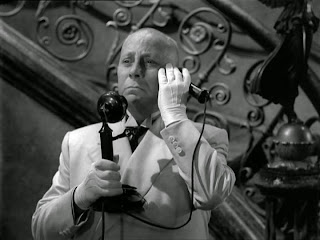HOLLYWOOD'S GOLDEN AGE
(Post 10 of 50)
I'm not sure Gentleman's Agreement is held in as high esteem as it once was. Despite winning Best Picture and Director for Elia Kazan at the 1947 Academy Awards, it really isn't on a lot of people's short list of great Kazan films. It also didn't make the 1001 book of movies you must see before you die. Perhaps this story of a gentile who goes undercover as a Jew to experience firsthand antisemitism may seem a little tame by modern movie standards, but I don't think that is being fair. We can learn a lot by subtle prejudice. Our hero (played by Gregory Peck) falls in love with a woman (Dorothy McGuire) who seems to be on his side as far as antisemitism goes. But there are problems lurking beneath the surface. Her dealings with her not-so-subtle family is one. They seem like nice folks, but a Jew moving into their neighborhood? Are you kidding? And her not willing to stand up to them for the sake of her relationship or her inability to tell someone who made an anti-semitic joke she didn't appreciate it is another. I think prejudice is something we fight every day. It's not just from the guys who say it to your face (like the scene above) it's the ones we don't expect. Sometimes it's ourselves. Sometimes we don't even know it.
Here's to a long life!:The five leading ladies of Gentleman's Agreement:
Dorothy McGuire as Peck's love interest died at the age of 85 in 2001.
Anne Revere, as Peck's mother, died at the age of 87 in 1990.
Celeste Holm, who won the Oscar for her supporting role died at the age of 95 in 2012.
Jane Wyatt, who plays McGuire's sister died at the age of 96 in 2006.
And June Havoc, who plays Peck's secretary died at the age of 97 in 2010.
Not sure what my point is here. I just found the consistent longevity of the cast kind of interesting.
And the Elisha Cook Jr. supporting player award goes to Anne Revere. I thought that Anne was only so-so in Secret Beyond the Door, but I like her very much here as Gregory Peck's mother. She conveys strength, determination and a great deal of maternal love. You can see where Peck's character gets his resolve. Also, let's give a nod to usual leading man John Garfield who took a nice supporting role here as Peck's Jewish military buddy.
























